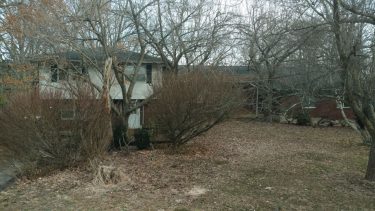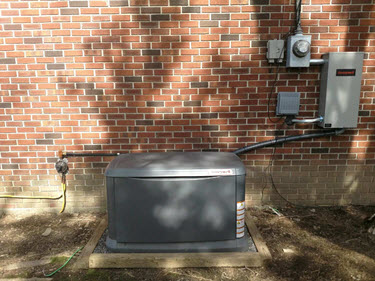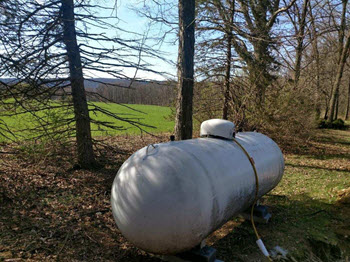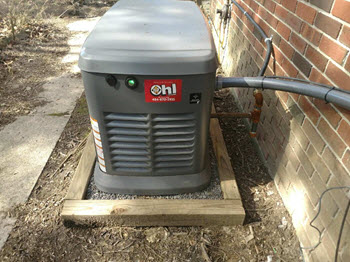Propane Generator Prevents Power Outages For Germansville PA Homeowner
 Our homeowner in Germansville, PA was tired of frequent power outages. These are common in rural parts of the Lehigh Valley. But, since he relied on electricity for heating, it could be a dire problem in the winter.
Our homeowner in Germansville, PA was tired of frequent power outages. These are common in rural parts of the Lehigh Valley. But, since he relied on electricity for heating, it could be a dire problem in the winter.
Of course, there’s not much you can do about problems with public utility lines. But, what you can do is set up an alternate power source for your home. That’s what our homeowner had in mind.
He wanted to use a generator when the power went out. This way, he could keep the lights – and the heat — on no matter what happened outside.
This isn’t an unusual request, especially in Monroe County. In areas dotted with small communities, many people have found ways to deal with no electricity.
All we had to to do was decide what to power sources to use. We walked through some options with our homeowner. Then, once he decided on what he wanted, we got to work.
Problem: A homeowner in Germansville, PA experienced frequent power outages. These were due to problems with utility lines rather than anything in his home.
Solution: Installed a propane-powered generator with an onsite 500-pound tank, whole-house transfer switch and second-stage regulator.
Power Outages In The Lehigh Valley
 Power outages are a common occurrence in rural areas. That’s why people like our homeowner are considering alternative energy sources. There are plenty of reasons for outages in places such as the Lehigh Valley. But the biggest cause is still one of the oldest: Trees.
Power outages are a common occurrence in rural areas. That’s why people like our homeowner are considering alternative energy sources. There are plenty of reasons for outages in places such as the Lehigh Valley. But the biggest cause is still one of the oldest: Trees.
Utility companies do their best to keep tree branches away from power lines. But, they can’t police entire lines all the time. Inevitably, a branch takes down a power line and interrupts service. The problem becomes more widespread as severe snowstorms and heavy rains become more common.
In Germansville, this happens often. A small community north of Allentown near the Lehigh Valley Zoo, it’s surrounded by open land and vegetation.
Thanks the nearby Jordan Creek and various state gaming lands, there are plenty of wooded areas near it. And, those are all opportunities for downed trees and branches to damage nearby power lines.
Losing power is inconvenient even when it’s just for a short time. But, it becomes even more difficult the longer it’s out. And, for people with electric heat, having no power for a while in the winter can become hazardous.
Our homeowner had experienced plenty of outages over the years. He wanted to ensure that his home would stay warm and powered no matter what happened. When he called us, we reviewed the options and energy sources he could use.
Using Propane To Heat And Power A House
 There are many benefits to using propane heat to provide power and heating for a home in the Lehigh Valley. It burns clean and is energy-efficient, offering more energy per unit than other sources. It’s stored on the property and keeps well even when it’s not used for a while.
There are many benefits to using propane heat to provide power and heating for a home in the Lehigh Valley. It burns clean and is energy-efficient, offering more energy per unit than other sources. It’s stored on the property and keeps well even when it’s not used for a while.
First, it’s clean burning. That’s not only good for the environment. It’s also better for our homeowner and his family.
Clean burning means this energy source gives off much less carbon monoxide than oil or natural gas. Carbon monoxide is odorless, tasteless and colorless — and poisonous. Too much exposure leads to nausea, dizziness and in severe cases death.
A well-working HVAC system will get rid of carbon monoxide through the exhaust. But, a malfunction can cause the gas to build up in the home. So, the less your heating and power supply create, the better.
And, the odds are that our homeowner will use his new heating system in the winter when outages are most likely. That’s also the time of year when people keep their windows closed.
Next, this energy source is energy-efficient. This means you get more energy per unit than other energy sources such as electricity or natural gas. And, when compared to oil, there’s less waste.
With any combustible fuel, some of the energy it creates gets lost through the exhaust process. With oil heat, an average of 15 percent of the heat gets lost. With propane, that number is just five percent.
There’s also another advantage in this situation. When heating oil sits for a long time without use, sediment forms in the tank. That can clog or damage the tank over time.
That’s not so in this case. There’s no buildup, no matter how long it sits. That’s an important factor here. Our homeowner isn’t using the tank and pipeline all the time, just when there’s an outage.
Installing A Generator To Provide Electricity
 Now that our homeowner had chosen his energy source, we got to work installing his new equipment. There were a lot of components to this. But, once we were done, he wouldn’t’ have to worry about losing electricity again.
Now that our homeowner had chosen his energy source, we got to work installing his new equipment. There were a lot of components to this. But, once we were done, he wouldn’t’ have to worry about losing electricity again.
We started off by installing his new tank. It’s one of the larger residential models, holding 500 pounds of liquefied gas. We installed it above ground, while the homeowner took care of digging a trench so we could hook it up correctly.
From there, we ran a line to the new generator. Then, we installed the transfer switch. This is part of the system that would allow our homeowner to switch his energy source when necessary.
Finally, we installed the second-stage regulator. This piece controls the flow of gas from to the generator. It’s essential in this case because the generator won’t always be working. It will only turn on intermittently. This regulator ensures the proper gas flow.
After that, our homeowner’s new system was ready to go. With his new generator and tank on the property, he will have heat and power in his home no matter what happens to any nearby utility lines.
Are you looking for a clean, efficient energy source to keep your heat and electricity running in the case of a power outage? Contact us, and we’ll design a system that’s perfect for you.
